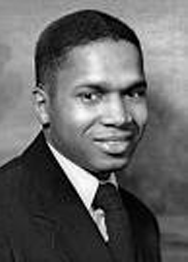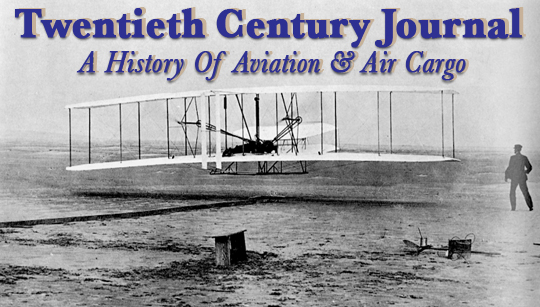Our
Martin Changed Air Cargo
 If
you want to learn about August Martin, the great air cargo pilot who flew
for Seaboard World Airlines during the 1950’s, and was also the
first black man to captain a U.S. flag air cargo airplane, you better
plan on either using your old Funk & Wagnall’s Encyclopedia,
or visiting the wonderful high school located near JFK International Airport
in Queens New York City named in honor of the air pioneer. If
you want to learn about August Martin, the great air cargo pilot who flew
for Seaboard World Airlines during the 1950’s, and was also the
first black man to captain a U.S. flag air cargo airplane, you better
plan on either using your old Funk & Wagnall’s Encyclopedia,
or visiting the wonderful high school located near JFK International Airport
in Queens New York City named in honor of the air pioneer.
The name August Martin as an internet search,
most often comes up as “August” 28, 1963, when “Martin”
Luther King delivered his never to be forgotten “I Have A Dream,”
speech at the Lincoln Memorial in Washington, D.C.
This August Martin, a gentle man would go
down in history as the first African American to serve as Captain on a
U.S. scheduled airline.
Put another way, before “Augie”
as his friends called him, there had never been a black airline captain
on the bridge of any U.S. flag airline.
Although he flew for other carriers, including
El Al Israel Airlines and a company called Buffalo Skylines between 1946
and 1955, it was Seaboard World Airlines, an air cargo company, which
hired Augie and broke through a glass ceiling in American culture.
Air cargo put a great aviation pioneer,
who happened to be black, in the left seat.
August Martin, who was born in 1916 had
aviation blood in his veins.
He worked all his life to be a pilot, training
as a youngster to fly small prop jobs and later during World War II as
a front line Mitchell B26 bomber pilot.
He also took training at the Tuskegee, Alabama
base, which spawned the legendary black pilots who gained fame as The
Tuskegee Air Men.
While awaiting his big break with a scheduled
U.S. flag carrier, Augie worked as a stevedore on the New York docks to
make ends meet.
But when SWA came a knocking, August Martin
was ready.
For the next thirteen years Martin piloted
the legendary all-cargo aircraft of SWA, including the Lockheed Constellation,
Canadair CL44 swing-tail freighter, Douglas DC-4 and DC-6 among others.
August Martin was not just about breaking
through for himself. Augie also gave back big time.
Often, he would donate his off time and
vacations, flying supplies to the impoverished in Africa, and other points
of emergency and need around the world.
On July 1, 1968 August Martin was killed
aboard just such a flight when his cargo-laden aircraft crashed in a blinding
rainstorm as he attempted to land in Biafra, Africa.
Today, in modern air cargo circles not much
is known or said about August Martin.
Air cargo groups and organizations, and
increasingly publications yearly name people to this and that “Hall
of Fame,” blithely unaware that one of the truly, great firsts in
the history of air cargo was a black man with the rank and responsibility
of Captain of a great international airline.
August Martin deserves charter membership
in any air cargo “Hall of Fame.”
Here was a guy who not only makes us proud,
he makes us look good.
History demands the truth.
Geoffrey
|




